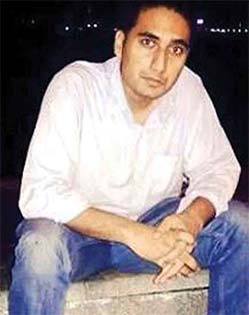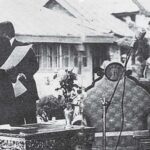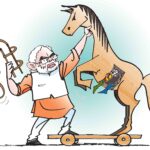HERE is what the 29-year-old Jaipur boy, Gaurav Agarwal, who topped in the UPSC exams in 2013, had to say when media persons asked him why he wanted to become a civil servant: “After finishing my studies in IIT and IIM, I worked in a top MNC in Hong Kong for four years. It was a highly paid and comfortable job in the investment banking sector but I decided to go for the civil services due to its distinguished elements. I found that the job of a civil servant is more challenging and very distinguished. The civil servant understands the issues and problems of people and has a chance to serve the people, so I finally decided to quit the job and returned to India for the preparations in 2011.”
In the same vein, Haritha Kumar, last year’s IAS topper, when asked why she wants to be an IAS officer said, “All of us have two dreams—one is to be successful in whatever career or field we choose, and the other is to become a responsible citizen and play an active role in the affairs of the country. I just tried to connect the two,” and when asked for any message for the readers she said, “Success does not come easily. Look at me! I had to strive for four years to reach where I am today. Also, remember that if you are willing to work hard at something, the universe will help you get there.”
In contrast, a news article published in The Hindu on January 27, 2014, says: “According to information provided by the DoPT—which comes under the Ministry of Personnel, Public Grievances and Pensions—the department received proposals of sanction for prosecution of 34 officers in 59 corruption cases from various investigative agencies/state governments between 2010 and 2013. Out of these, sanction for prosecution of 19 IAS officers was granted in 33 cases under the Prevention of Corruption Act 1988. Corruption cases against 15 officers of the Indian Administrative Service are pending.”
Not much different is the news of the Deputy Inspector General of Police in the Police Training School, Meerut, having been booked on charges of alleged molestation of a woman cop, whom he had reportedly called to his office and harassed or the charges of sexual harassment levelled by a woman trainee 2012-batch IPS officer on 2010-batch IPS officer Sanjiv Tyagi who tendered an unconditional apology but was later found guilty by an inquiry committee and was placed under suspension.
These are all stories related with persons who have made it to the civil services at different points of time. Despite having lost muchof their sheen and charm, to get admitted into IAS, IPS, Income Tax, Customs and other such services are even today considered the pride of allservices in India.
But there is one fundamental difference between the first set of stories related with Gaurav and Haritha and the second set of stories related with IAS officers in the prosecution net or under the scanner for sexual harassment cases. This difference is quite apparent and does not need much elucidation.
While the first set of news is full of positive energy and positive vibes, enthusiastic, hopeful, cheery, idealistic, dreamy and optimistic, the other set gives a very visible impression of the game lost, opportunity given away and milk spilt where what seems to have remained is a sense of despondency, helplessness, innocence lost and idealism having turned gloomy.
The question here is: How did it happen? How was such a transformation made? When did the idealism, enthusiasm, keenness, empathy and urge for positive contributions to the nation and the society get converted into self-aggrandisement, pleasure-seeking, power brokerage and such traits which were never there in the person when he entered the services with high hopes and lots of aspirations?
It is this question that each civil servant needs to keep asking himself and answering. The reasons, as we all know, are not very difficult to understand. Gaurav Agarwal, when he is joining the service today, or Haritha Kumar, when she was joining the IAS in 2013, or Sanjiv Tyagi who joined the IPS in 2012, was each nothing more than a young person. They had no power, no authority, no paraphernalia, no official backup and to system to bank upon. If they wanted to buy railway tickets, they did so as every other citizen of this nation. When they went to cinema halls, they enjoyed the pictures like everyone else. When they moved about in the malls, they were there like all others.
But the moment they entered the halls of power and authority, they became somebody. They are no longer simply Gaurav, Haritha, Sanjiv. They become Gaurav, IAS, Haritha, IAS or Sanjiv IPS. These civil servants tend to get official vehicles, official personal staff and, more important, the authority of government and governance. This authority and the fanfare associated with the authority is something that has an elixir-like effect on most of those who become a part of this selective group. To be fair and frank with myself, I readily admit that I was personally no exception to this rule when I entered the IPS in 1992. My personal incidences of foolishness ranged to such extents that today when I start remembering them, I start feeling genuinely ashamed of myself. Again, to me it seems that such effects are more glaring in cases like mine where the person belongs to an ordinary family for whom the civil services had always been a dream.

It is this sense of power and authority that often has a damaging and damning effect on most of us. It is at this point of time when the real self comes into the picture and the true identity emerges. Now that a person has everything he/she always hoped for, the question of using these powers and authority arises. Those of us who manage to maintain the desired poise and balance and continue treating these services with the same philosophy definitely turn into true civil servants, in the real sense of the word, serving people and making the nation and society proud of them and their acts.
OTHERS, who unfortunately lose track and start taking these powers, prestige, perks and privileges as guaranteed, also lose the moral of their life-story, going tangentially in the direction they possibly would not have dreamt of or desired at the time of entering the services but which they don’t even understand because of having been overpowered by the false sense of power and authority. It also needs to be kept in mind that the majority does not get actually caught despite the 34 IAS officers mentioned above whose cases got referred to DoPT because the power also provides a host of means and measures to keep ourselves floating. But can a person deceive his own heart which fully knows which path it has chosen? Hence, ultimately, it boils down to talking straight and truly to one’s heart and coming back to the path on which one started the journey with so much fanfare, hopes and aspirations.
The paradise lost through the misguided civil servant is not restricted to the innocence lost with the concerned individual but has its repercussions on the entire society. Hence, a corrective measure taken at any stage of life, so as to become a Gaurav or a Haritha again in life, is what would make a huge difference to the person and society.
Amitabh Thakur, an IPS officer from UP, is also working for transparency in governance. The views expressed
are personal
















































